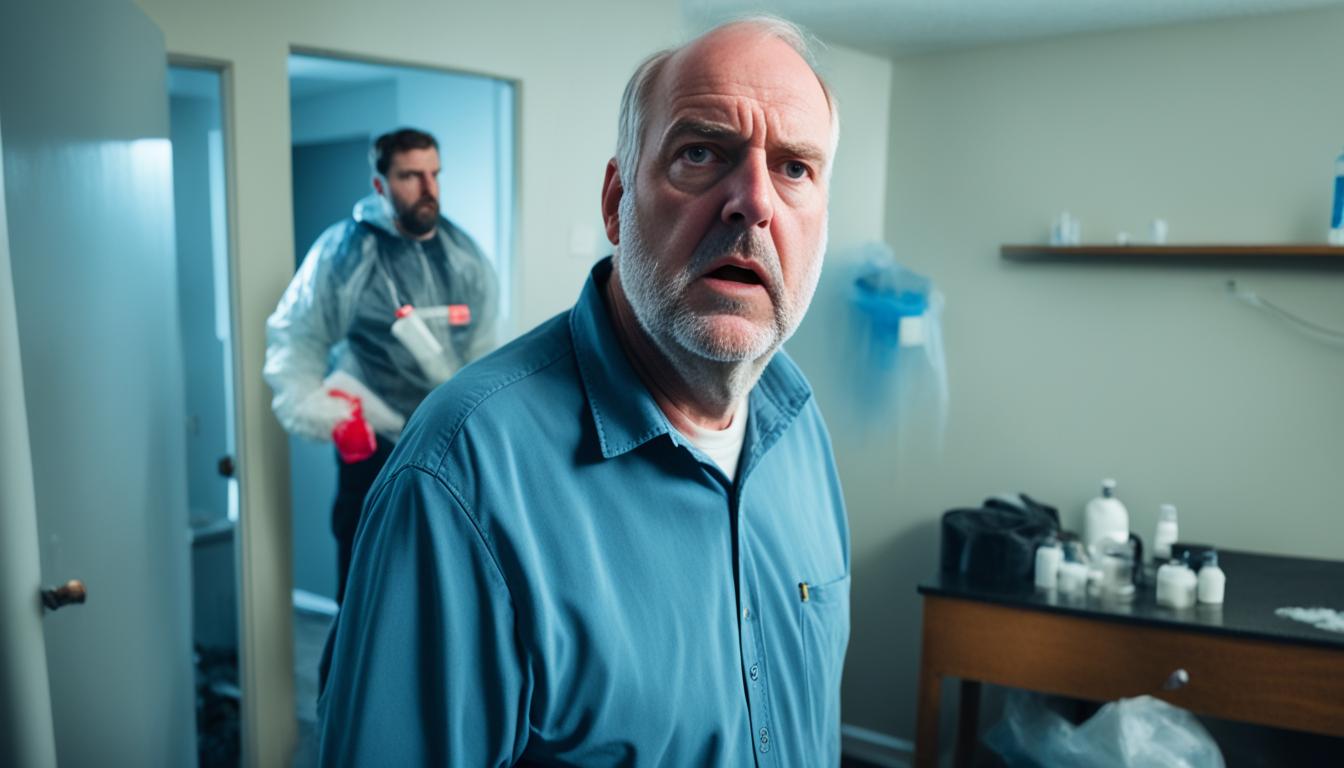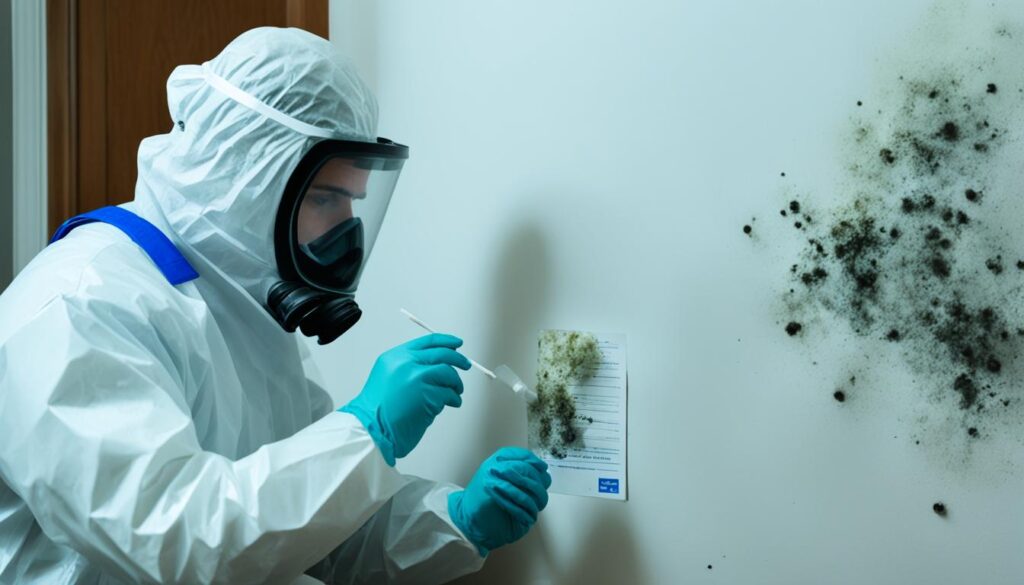
Landlord’s Duty: Is Mold Testing Their Responsibility?
When it comes to maintaining a safe and healthy living environment, landlords have a crucial role to play. One of the key concerns for both landlords and tenants is the presence of mold in rental properties. Mold can not only cause property damage but also pose a significant health risk to occupants. As a landlord, it is important to understand your responsibilities when it comes to mold testing in rental properties, as well as your liability in case of mold issues.
Fix Mold Miami is Florida’s Highest Rated In Mold Assessments, Prevention, and Remediation company that specializes in addressing mold-related issues in rental properties. With their expertise, they can provide valuable insights into the landlord’s duty and liability when it comes to mold testing and prevention.
Key Takeaways:
- Landlords have a responsibility to ensure the safety and well-being of their tenants.
- Mold testing in rental properties is essential to identify and address potential mold issues.
- Landlords may be held liable for any mold-related health issues or property damage resulting from negligence.
- Contact Fix Mold Miami at 305-465-6653 for expert assistance in mold assessments, prevention, and remediation.
- Stay proactive in preventing mold growth by implementing regular inspections and maintenance in your rental properties.
Understanding Tenant Mold Exposure Rights
Tenants have the right to live in a safe and healthy environment, free from the potential hazards of mold exposure. Landlords play a crucial role in ensuring that rental properties are mold-free and taking preventive measures to protect their tenants’ well-being.
Fix Mold Miami, Florida’s Highest Rated In Mold Assessments, Prevention, and Remediation, understands the importance of tenant mold exposure rights. With their expertise and commitment to mold prevention, they can assist both landlords and tenants in creating a mold-free living environment.
Landlords have the responsibility to implement effective mold prevention strategies and maintain a mold-free rental property. This includes conducting regular inspections, promptly addressing any signs of mold growth, and implementing preventive measures to minimize the risk of mold contamination.
In order to protect tenants, it is essential for rental agreements to include clauses related to mold inspection and prevention. These clauses can outline the landlord’s responsibilities in ensuring a mold-free environment and provide tenants with the right to request mold inspections if they suspect mold growth.
“Tenants have the right to live in a safe and healthy environment, free from the potential hazards of mold exposure.”
The Importance of Landlord Mold Prevention
Effective mold prevention measures not only protect tenants from potential health risks but also safeguard the structural integrity of the rental property. Mold can cause significant damage to building materials and lead to costly repairs if left unaddressed. By implementing proactive mold prevention strategies, landlords can ensure the longevity of their rental properties.
Mold Inspection and Rental Agreements
Incorporating mold inspection clauses in rental agreements provides tenants with an added layer of protection. These clauses enable tenants to request mold inspections if they suspect mold growth or experience symptoms associated with mold exposure.
By addressing mold concerns promptly and engaging trusted professionals like Fix Mold Miami, landlords can demonstrate their commitment to maintaining a safe and healthy living environment for their tenants.
| Tenant Mold Exposure Rights | Landlord Mold Prevention | Mold Inspection Rental Agreement |
|---|---|---|
| Protect tenants from potential health risks | Safeguard the rental property’s structural integrity | Include clauses for tenants to request mold inspections |
| Ensure a safe and healthy living environment | Prevent costly repairs due to mold damage | Demonstrate commitment to tenant well-being |
The Importance of Mold Testing in Rental Properties
Mold is a common problem in many homes and can pose significant health risks to tenants. As a landlord, it is your duty to ensure the safety and well-being of your tenants. This includes taking proactive measures to prevent and address mold issues in your rental properties.
Mold testing is a crucial step in identifying and addressing mold problems. Regular mold testing can help you detect mold growth early on and take appropriate measures to mitigate it. By conducting mold testing, you can ensure that your rental property remains a healthy living environment for your tenants.
One of the key reasons why mold testing is vital is the potential health risks associated with mold exposure. Mold spores can cause respiratory problems, allergies, and other health issues, particularly for individuals with weakened immune systems. By testing for mold, you can identify areas of concern and implement remediation measures to safeguard your tenants’ health.
Mold testing also provides you with documentation that illustrates your commitment to maintaining a safe and habitable living environment. In the event of any legal disputes or claims related to mold, having records of mold testing can demonstrate that you fulfilled your duty as a responsible landlord.
It is important to note that mold testing should be conducted by professionals who specialize in mold assessments and remediation. They have the expertise and equipment to accurately identify the presence of mold and determine the extent of the problem.
“Regular mold testing can help identify and address mold issues early on, ensuring the well-being of your tenants and protecting yourself from potential legal liabilities.”
The Benefits of Mold Testing in Rental Properties
1. Early Detection: Mold testing allows you to identify mold growth before it becomes a major problem. Early detection enables you to take prompt action and prevent further damage to your rental property.
2. Preventive Measures: By conducting regular mold testing, you can implement preventive measures to avoid mold growth. This includes addressing any potential moisture issues and maintaining proper ventilation in your rental properties.
3. Tenant Satisfaction: Mold-free living environments contribute to tenant satisfaction. When tenants feel safe and comfortable in their rental homes, they are more likely to remain long-term tenants and take care of the property.
| Benefits of Mold Testing in Rental Properties: |
|---|
| Early Detection |
| Preventive Measures |
| Tenant Satisfaction |
Mold testing is not only a necessary step in fulfilling your duty as a landlord but also a way to protect your investment. By being proactive in testing for and addressing mold issues, you can ensure the long-term well-being of your tenants and the preservation of your rental property’s value.

If you need professional assistance with mold testing, prevention, or remediation, contact Fix Mold Miami at 305-465-6653. Our team of experts specializes in mold assessment and remediation, ensuring a safe and healthy living environment for your tenants.
Landlord Responsibilities in Mold Inspection and Remediation
When it comes to rental properties, landlords have specific responsibilities when it comes to mold inspection and remediation. It is crucial for landlords to address mold issues promptly and effectively to ensure the safety and well-being of their tenants. Failure to do so can lead to potential health hazards, legal liabilities, and damage to the property.
Here are the key steps that landlords should take to fulfill their responsibilities:
- Mold Inspection: Landlords should conduct regular mold inspections in their rental properties to identify any potential mold growth. These inspections should be thorough, covering all areas where moisture can accumulate, such as bathrooms, kitchens, basements, and attics.
- Mold Testing: In cases where mold growth is suspected, landlords should consider conducting mold testing by hiring a professional mold inspector. This testing can provide accurate information about the type and severity of the mold problem, helping landlords determine the appropriate remediation measures.
- Mold Remediation: If mold is discovered in the rental property, landlords have a responsibility to address the issue promptly. This may involve hiring qualified professionals to safely remove the mold, clean affected areas, and prevent its recurrence.
- Rental Agreement: To ensure clarity and protect both parties, landlords should include specific clauses related to mold inspection and remediation in the rental agreement. This can outline the landlord’s responsibility for mold prevention and the tenant’s obligation to report any signs of mold growth.
- Communication with Tenants: Landlords should maintain open communication with their tenants regarding mold-related issues. This includes informing tenants about any planned mold inspections, sharing the results of tests, and addressing any concerns or complaints raised by tenants promptly.
- Regular Maintenance: To minimize the risk of mold growth, landlords should also prioritize regular maintenance of the rental property. This includes fixing any leaks or plumbing issues, ensuring proper ventilation, and addressing any water damage promptly.
Landlord Mold Liability
Landlords can potentially be liable for mold-related issues in their rental properties. This liability can arise if it is proven that the landlord was aware of a mold problem but failed to take appropriate action to address it. Additionally, if a tenant suffers damages or health issues due to mold exposure, they may have legal grounds to seek compensation from the landlord.
By fulfilling their responsibilities in mold inspection and remediation, landlords can mitigate their liability and ensure a safe and healthy living environment for their tenants.

Fix Mold Miami is Florida’s Highest Rated In Mold Assessments, Prevention, and Remediation. Contact Fix Mold Miami at 305-465-6653 for professional assistance in ensuring mold-free rental properties.
| Mold Inspection and Remediation Checklist | Landlord Responsibilities |
|---|---|
| Conduct regular mold inspections | ✓ |
| Hire professional mold inspectors | ✓ |
| Address mold issues promptly | ✓ |
| Include mold clauses in rental agreements | ✓ |
| Maintain open communication with tenants | ✓ |
| Regular property maintenance | ✓ |
Conclusion
In conclusion, the responsibility for mold testing in rental properties falls on the landlord. Landlords have a duty to ensure the safety and well-being of their tenants, which includes taking measures to prevent and address mold issues. While there may not be specific laws mandating mold testing, landlords can be held liable if their negligence leads to tenant health problems due to mold exposure.
Tenants also have certain rights when it comes to mold exposure. They should expect landlords to implement effective mold prevention strategies, such as regular inspections and proper maintenance. Additionally, tenants should consider including mold inspection clauses in their rental agreements to further protect themselves.
To fulfill their duty, landlords should prioritize mold testing in rental properties. Regular inspections can help identify mold growth early on, preventing further damage and potential health hazards. Landlords should also promptly address any mold issues that arise, ensuring proper cleanup and taking necessary steps to prevent future mold growth.
In summary, landlord mold liability is a crucial aspect of rental property management. Landlords have a duty to test for mold, while tenants have the right to a safe and healthy living environment. By prioritizing mold prevention, regular inspections, and prompt remediation, landlords can fulfill their responsibilities and protect the well-being of their tenants. For professional mold assessment, prevention, and remediation services, contact Fix Mold Miami at 305-465-6653.




